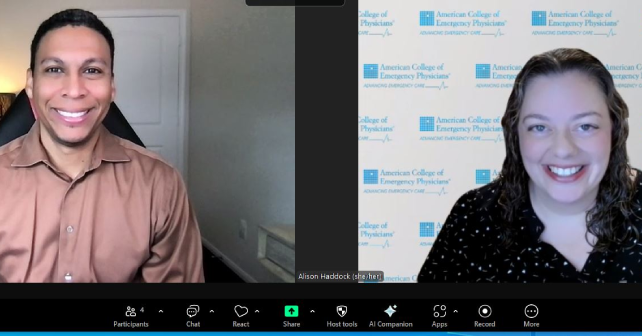
We already face a dysfunctional marketplace because of EMTALA, which means that we will see everyone who comes through the door, regardless of their insurance coverage. You can’t set up an emergency department and say, “Hey, we don’t take Medicare and Medicaid in a hospital.” Hospitals have to participate in Medicare. They have to accept these kinds of insurance. There are some EMTALA mandates and those mandates are important to protect our patients. I think they’re a driver for a lot of us to go into emergency medicine, but they also create a very unusual negotiating environment in terms of the free marketplace that we generally try to have in America.
Explore This Issue
ACEP Now: Vol 43 – No 12 – December 2024Dr. Dark: I’ve known you for a long time now and in our conversations, you’ve always stressed to me your concern about membership of the College. I often will talk to people that aren’t ACEP members but are emergency physicians, and one of the things that they ask me is, “What is ACEP doing for me?” What would be your answer to them?
Dr. Haddock: We are constantly trying to empower our members, protect our members, and make the practice of emergency medicine better. There is such a huge spectrum of things that we’re doing. Some of our most important work right now is around the Open Book project and creating policies that define what a good workplace looks like for emergency physicians. The reimbursement work that we do is critically important. We’re representing you at the [RVS Update Committee] and trying to make sure that the RVUs for the services that we provide in emergency medicine are fair.
It’s also going to Congress and having conversations about balance billing and the dispute resolution process. It’s also, at a more individual level, looking at how we can make each individual emergency department better for both patients and physicians. Now we’re looking at the next level. Can we accredit emergency departments broadly and have even better requirements in terms of what it requires the workplace to offer you as a physician—and offer you in terms of resources for your patients?
The last point I will make is boarding. Boarding is crushing us all in emergency medicine right now. It is absolutely an example of that lack of resources that don’t let you be the kind of doctor that you went into emergency medicine to be. We’re doing critical work now advocating with the [Agency for Healthcare Research and Quality] and the federal government, trying to act on boarding so hospitals are under more pressure to solve boarding. We know it’s not an emergency department problem. It’s a health system overload problem that needs to be solved on a higher level. That kind of advocacy is something that you can’t get anywhere else other than ACEP. I hope folks will recognize that, and I hope they become members so that they can participate in that and get a better workplace for themselves and their patients.




No Responses to “A Conversation with ACEP President Dr. Alison Haddock”